
Journal of Transportation Security
Scope & Guideline
Exploring the Nexus of Security and Mobility
Introduction
Aims and Scopes
- Transportation Security Risk Assessment:
The journal emphasizes methodologies for assessing and mitigating risks in transportation systems, including but not limited to aviation, maritime, and road transport. - Cybersecurity in Transportation:
A significant focus on the intersection of cybersecurity and transportation, exploring vulnerabilities in transportation networks and the implementation of protective technologies. - Human Factors in Transportation Security:
Research on the human elements influencing transportation security, including the behavior of passengers, personnel training, and public perceptions of safety. - Technological Innovations for Security:
The journal highlights advancements in technology that enhance security measures, including AI, machine learning, and computer vision applications in screening and monitoring. - Policy and Legal Frameworks:
An exploration of the regulatory and legal aspects of transportation security, addressing the implications of laws and policies on safety practices. - Global Perspectives on Transportation Security:
The journal aims to provide insights into international transportation security challenges, reflecting on case studies and practices from various countries.
Trending and Emerging
- AI and Machine Learning Applications:
A significant trend is the integration of AI and machine learning in transportation security, as seen in studies focusing on baggage inspection and cyber threat detection, showcasing the relevance of these technologies in enhancing security measures. - Cyber Threats and Resilience Strategies:
Recent publications underscore the growing concern around cybersecurity threats in transportation, with an emphasis on developing resilience strategies against attacks on connected transportation systems. - Public Safety Mapping and Crime Data Integration:
Emerging research highlights the importance of mapping safe transport routes using crime data, reflecting a societal need for enhanced public safety and informed decision-making in transportation. - Drones and Emerging Technologies:
The exploration of drones and other emerging technologies for security purposes is gaining traction, indicating a shift towards innovative solutions in monitoring and surveillance within transportation contexts. - Human Trafficking and Transportation Security:
An increasing focus on the intersection of human trafficking and transportation security reflects a growing awareness of social issues that impact public safety.
Declining or Waning
- Maritime Piracy and Armed Robbery:
Research on maritime piracy, while once prominent, has decreased significantly, possibly reflecting a reduction in high-profile incidents or a shift toward addressing more pressing security concerns in transportation. - Traditional Security Screening Methods:
There appears to be a waning interest in conventional security screening methods as newer technologies and methodologies are gaining traction, indicating a shift towards more innovative approaches. - Legal Aspects of Transportation Security:
The frequency of publications addressing the legal frameworks surrounding transportation security has diminished, suggesting that researchers may be prioritizing practical security measures over legal discussions. - Passenger Behavior in Security Contexts:
While human factors remain important, specific studies focusing solely on disruptive passenger behavior have become less frequent, indicating a possible shift towards broader behavioral studies. - Static Risk Assessment Models:
Research focusing on traditional static risk assessment models has declined, likely as the field moves towards more dynamic and adaptable risk management strategies.
Similar Journals
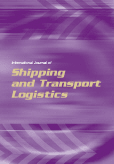
International Journal of Shipping and Transport Logistics
Elevating Standards in Transport and Logistics ScholarshipWelcome to the International Journal of Shipping and Transport Logistics, a premier academic journal published by INDERSCIENCE ENTERPRISES LTD that serves as a vital platform for researchers, practitioners, and students in the fields of logistics, transportation, and management. Established in 2009 and converging through to 2024, this journal is committed to advancing scholarly discussions and innovations related to shipping logistics, supply chain management, and the integration of technology in transportation systems. As evidenced by its Q3 rankings across multiple categories in the 2023 Scopus classification, including Business and International Management, and Management of Technology and Innovation, this journal is recognized for its contributions to the academic community. Though currently not an open access journal, it offers subscriptions that facilitate access to high-quality research and case studies relevant to contemporary challenges in the shipping and transport logistics sectors. Engage with the latest findings and insights that are critical for developing sustainable and efficient transportation strategies globally.

Revista de Transporte y Territorio
Advancing Sustainable Solutions for Urban MobilityRevista de Transporte y Territorio is a prominent academic journal published by the University of Buenos Aires, Institute of Geography, dedicated to the study of transportation systems and territorial dynamics. With its ISSN 1852-7175, this journal serves as a crucial platform for disseminating cutting-edge research and innovative practices in the fields of geography, urban planning, and transportation studies. Aimed at researchers, professionals, and students alike, the journal seeks to foster dialogue and understanding of the interrelationships between transportation and territorial development, providing insights into sustainable solutions for contemporary mobility challenges. Although currently not designated as Open Access, the journal is committed to high academic standards, ensuring that all published works undergo rigorous peer review. Situated in Buenos Aires, Argentina, the Revista de Transporte y Territorio not only highlights regional issues but also contributes to the global discourse on transportation and territory.
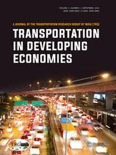
Transportation in Developing Economies
Transforming transportation discourse for developing economies.Transportation in Developing Economies is a premier academic journal published by SPRINGER INT PUBL AG, specializing in the interdisciplinary study of transportation systems in developing nations. With an ISSN of 2199-9287 and an E-ISSN of 2199-9295, this journal provides an essential platform for researchers, policymakers, and practitioners to explore the unique challenges and innovations in transportation infrastructure, mobility, and planning within emerging economies. The journal aims to critically assess and promote sustainable transport solutions that cater to the socio-economic dynamics of these regions, making it an invaluable resource for those invested in equitable transportation development. With its open access philosophy, it ensures widespread dissemination of research findings, fostering collaboration and knowledge exchange among scholars and industry professionals alike. As the global focus on sustainable practices intensifies, Transportation in Developing Economies stands at the forefront of vital research, contributing to both academic discourse and pragmatic advancements in the field.
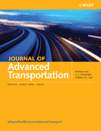
JOURNAL OF ADVANCED TRANSPORTATION
Pioneering Research for a Sustainable Transportation LandscapeJOURNAL OF ADVANCED TRANSPORTATION, published by WILEY-HINDAWI, stands as a pivotal platform in the fields of automotive engineering, computer science applications, economics, mechanical engineering, and strategy and management. With an impressive impact factor and positioned in the Q2 quartile across multiple categories as of 2023, this open-access journal offers researchers, professionals, and students unparalleled opportunities to disseminate and access cutting-edge research. Operating under an open access model since 2017, the journal fosters global collaboration and knowledge exchange, encouraging innovative solutions to contemporary transportation challenges. Its comprehensive scope, spanning converged years from 1979 to 2024, reflects its commitment to addressing the evolving landscape of transport systems worldwide. Researchers from diverse disciplines are invited to contribute transformative studies that advance the field and inspire future endeavors.
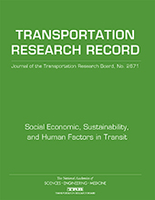
TRANSPORTATION RESEARCH RECORD
Advancing Knowledge in Transportation EngineeringTRANSPORTATION RESEARCH RECORD is a premier journal published by SAGE PUBLICATIONS INC, focusing on the latest advancements and research in the fields of civil and structural engineering as well as mechanical engineering. Since its inception in 1974, this journal has become an essential platform for disseminating innovative methodologies, case studies, and comprehensive reviews that address critical issues in transportation systems and infrastructure. With a respectable Q2 ranking in both engineering categories as of 2023, it solidifies its position among reputable publications, catering to a diverse range of scholars, professionals, and students. The journal not only facilitates access to high-quality research but also plays a pivotal role in shaping policy and practice through its robust findings. For those invested in the engineering disciplines, particularly within the transportation domain, TRANSPORTATION RESEARCH RECORD is an invaluable resource, with a wide array of topics covered throughout converged years, from 1974 to 1990, and from 1993 to 2024, ensuring a comprehensive exploration of historical and contemporary challenges in transportation.
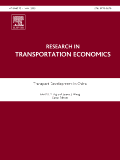
Research in Transportation Economics
Transforming Transportation Insights into Policy ActionResearch in Transportation Economics, published by Elsevier Science Ltd, is a leading academic journal dedicated to the advancement of knowledge in the fields of transportation economics and policy. With an ISSN of 0739-8859 and an E-ISSN of 1875-7979, this journal serves as a critical platform for researchers, scholars, and practitioners to contribute groundbreaking studies and analyses that influence both theoretical frameworks and practical applications. Recognized with a Q1 rank in the category of Economics, Econometrics, and Finance (miscellaneous) and a Q2 rank in Transportation for 2023, the journal stands out in its commitment to rigorous research, presenting insights that enhance our understanding of economic dynamics within the transportation sector. With a robust Scopus ranking positioned at #9 out of 242 in its primary category, achieving a remarkable 96th percentile rating, Research in Transportation Economics is integral for those looking to explore the intersection of economics and transport systems. The journal welcomes contributions on various themes ranging from transport policy analyses to the evaluation of economic impacts on transportation systems, thus playing a vital role in shaping future policies and practices in the industry. As the field continues to evolve, the journal's annual publications from 2004 to 2024 will provide ongoing opportunities for scholarly exchanges and innovations.
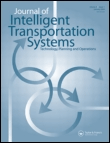
Journal of Intelligent Transportation Systems
Connecting Ideas and Technologies for Safer RoadsThe Journal of Intelligent Transportation Systems is a premier peer-reviewed journal published by Taylor & Francis Inc, focusing on cutting-edge research in the fields of transportation systems and intelligent technologies. With an ISSN of 1547-2450 and an E-ISSN of 1547-2442, this journal stands out with its impressive impact, consistently ranking in the Q1 Quartile across multiple categories such as Aerospace Engineering, Applied Mathematics, and Automotive Engineering, among others. As of 2023, it holds distinguished Scopus rankings, including a remarkable #11 position in Aerospace Engineering, showcasing its significance in shaping contemporary research in intelligent transportation. Targeted at researchers, professionals, and students alike, the journal provides a forum for the dissemination of innovative ideas and technologies that enhance transportation systems’ efficiency, safety, and sustainability. The Journal of Intelligent Transportation Systems has been operating since 2004 and continues to play a vital role in advancing knowledge within its respective areas of study within the United Kingdom and globally.
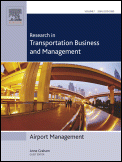
Research in Transportation Business and Management
Exploring the Intersection of Business and Transportation.Research in Transportation Business and Management is a prominent academic journal published by ELSEVIER that specializes in the interdisciplinary analysis of transportation business practices and management strategies. With an ISSN of 2210-5395 and an E-ISSN of 2210-5409, this journal has established itself as a critical resource in the fields of business, management, and transportation studies. It boasts an impressive Q1 ranking across multiple categories, including Business and International Management, Decision Sciences, and Management Science, indicating its top-tier status among peer-reviewed journals. The journal serves as a platform for innovative research and theoretical advancements, welcoming contributions that address contemporary challenges and emerging trends in transportation systems. Although it operates with subscription access, the journal’s comprehensive analyses and empirical studies are essential for researchers, professionals, and students aiming to understand the complex interface of transportation, commerce, and policy-making. Located in Amsterdam, Netherlands, Research in Transportation Business and Management is committed to facilitating the exchange of knowledge and insights within this evolving and vital sector up to the year 2024.
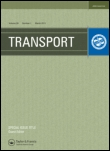
Transport
Fostering collaborations for a sustainable transport future.Transport is a leading open-access journal published by VILNIUS GEDIMINAS TECH UNIVERSITY, specializing in the fields of automotive and mechanical engineering. Since its transition to open access in 2018, the journal has become a vital platform for disseminating high-quality research and innovative practices in transport systems, engineering technologies, and sustainable mobility solutions. With an ISSN of 1648-4142 and an E-ISSN of 1648-3480, Transport is indexed in Scopus with notable rankings, including Q2 in Automotive Engineering and Q3 in Mechanical Engineering for 2023, reflecting its influential presence within these disciplines. Researchers and practitioners are encouraged to contribute to this scholarly community, where their work will reach a robust international audience, thereby advancing knowledge and fostering collaborations in the ever-evolving transport sector. Based in Lithuania, the journal is committed to maintaining rigorous peer-review standards and promoting interdisciplinary studies to address the complex challenges in transportation engineering.
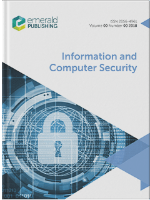
Information and Computer Security
Empowering Researchers in Information Systems SecurityInformation and Computer Security, published by Emerald Group Publishing Ltd, is a leading academic journal dedicated to advancing the field of information security and computer science. With an ISSN of 2056-4961, this journal has established itself as a reputable platform for disseminating high-quality research since its inception in 2015. As reflected in its impressive Q2 category rankings across multiple disciplines, including Computer Networks and Communications, Information Systems, and Management of Technology and Innovation, it serves as an important resource for researchers, professionals, and students alike. The journal is indexed in notable databases, securing a rank of 51/148 in Information Systems and Management, placing it within the 65th percentile of its category. Although it does not offer open access options, its contributions to understanding the complexities of security challenges in information systems make it essential for anyone involved in researching or implementing security solutions. With a striking array of converged years extending to 2024, Information and Computer Security continues to shape the conversation on contemporary issues in information security.